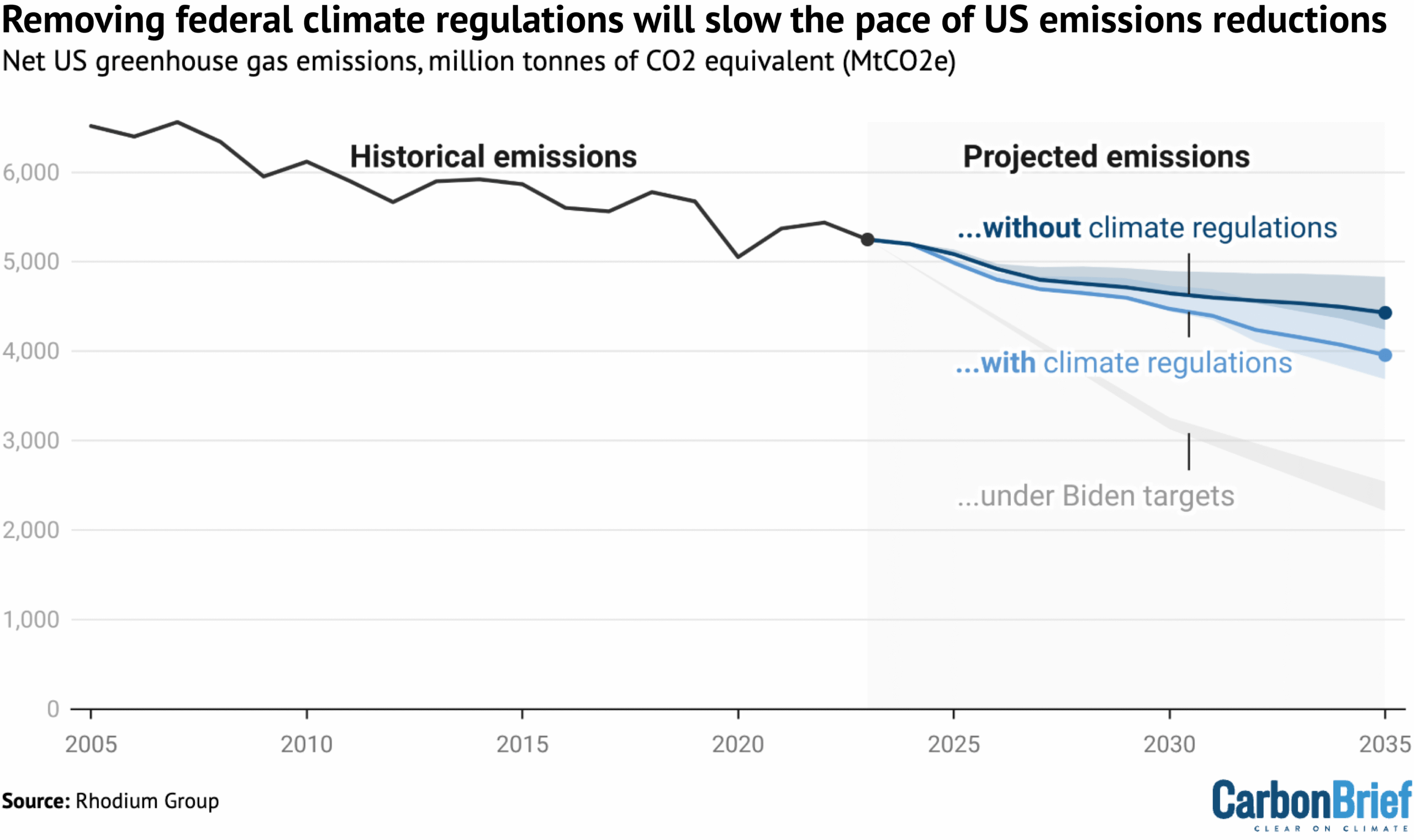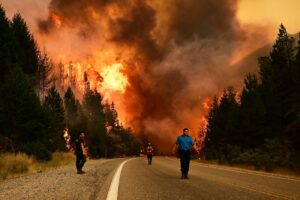Welcome to Carbon Brief’s China Briefing.
China Briefing handpicks and explains the most important climate and energy stories from China over the past fortnight. Subscribe for free here.
Key developments
China fails to submit 2035 climate pledge
MISSED DEADLINE: China, along with 181 other countries, missed the deadline to submit its next “nationally determined contribution” (NDC), a key climate pledge to the UN that “acts as an accountability measure to ensure countries are taking climate change seriously”, Agence France-Presse reported. It added that, according to unnamed analysts, China is “expected to release its much-anticipated NDC in the second half of 2025”. Chinese foreign ministry spokesperson Guo Jiakun said China will follow its “own path, approach and pace to fulfil the ‘dual-carbon’ targets to which it has committed”, in comments covered by industry newspaper China Energy Net. According to the outlet, he added that the country has “always been a doer and an activist in addressing climate change” and will submit its NDC “at the proper time”.
WAIT AND SEE: According to the Guardian, China and other countries would prefer “putting off the publication of [NDCs]” until the early disruption caused by the second Trump administration subsides. In a statement, Yao Zhe, global policy advisor at Greenpeace East Asia, said that “China’s submission will happen later this year”, adding that China must set “ambitious” goals that “include both a strong commitment to renewables and clear measures to move away from coal”. Li Shuo, director of the Asia Society Policy Institute’s China climate hub, told Eco-Business that China’s desire to wait and see how the US will “reshape” global political and economic orders is “natural”, adding that “the hope is that more time will lead to better quality”. China was not alone in missing the NDC deadline, with countries accounting for 83% of global emissions falling short, according to Carbon Brief analysis.
-
Sign up to Carbon Brief’s free “China Briefing” email newsletter. All you need to know about the latest developments relating to China and climate change. Sent to your inbox every Thursday.
OIL ‘SLOWDOWN’: Elsewhere, a new report by the International Energy Agency (IEA) and covered by Bloomberg found that “China’s use of the three most important fuel products – gasoline, jet/kerosene and gasoil – declined slightly to 8.1m barrels a day in 2024”, marking an “unprecedented” slowdown. The outlet said the shift, attributed by the IEA to the uptake of electric vehicles and economic changes, could drive a plateau in the country’s overall oil demand this decade.
Clean-energy technology’s economic contribution rises
GROWTH DRIVER: Clean-energy technologies contributed 13.6tn yuan ($1.9tn) to the Chinese economy in 2024, comprising more than 10% of GDP for the first time, new research for Carbon Brief has found. Much of the rise was driven by the value of goods and services, which grew 21% compared to 2023, as opposed to investment, which was up 7% year-on-year, the analysis added.
‘NEW THREE’ LEAD: The “new three” industries accounted for most of this growth. Electric vehicles and vehicle batteries “were the largest contributors to China’s clean-energy economy in 2024”, comprising almost 40% of its value. The next largest category was solar power, which generated 2.8tn yuan ($390bn).

GAINING IMPORTANCE: Clean-energy technologies contributed more to the economy in 2024 than real-estate sales (9.6tn yuan, $1.3tn) and agriculture (9.1tn yuan, $1.3tn), the analysis said. It added that China’s investment in clean energy alone is “close to the global total [investment] put into fossil fuels in 2024”. Investment is set to grow in 2025, due in part to a “race to complete” large-scale projects before the end of the five-year plan period (2021-2025). The importance of clean energy to supporting economic growth now “creates incentives for policymakers to ensure the economic health of the sector”, the analysis added.
Wang Yi’s European tour
STRATEGIC DIALOGUE: Chinese foreign minister Wang Yi met with UK prime minister Keir Starmer in his first official visit to the country in a decade, Reuters said, adding that the two “discussed strengthening cooperation in dealing with climate change, artificial intelligence and clean energy”. Wang also held talks with his UK counterpart David Lammy, English-language state broadcaster CGTN said, in which the two foreign ministers “emphasised the importance of advancing the full and effective implementation of the Paris Agreement and supporting both countries’ green transitions”.
WARM WELCOME?: Bloomberg covered development of China’s “impending listing of an inaugural sovereign green bond in London”, quoting Nneka Chike-Obi, head of Asia-Pacific ESG ratings and research at Sustainable Fitch, saying the move would allow China “to get…feedback from international investors” during roadshows and deliver assurances about its climate plans. China has released a “framework” for its green sovereign bonds, the Communist party-affiliated People’s Daily announced, adding the document will be used as the “basis for issuing Chinese green sovereign bonds overseas”. Meanwhile, the UK’s security services are reviewing whether “Chinese technology such as solar panels or industrial batteries could pose potential future security threats”, the Financial Times reported.
SECURITY TALKS: Wang also travelled to Germany, where he said at the Munich Security Conference that China has “acted earnestly on the Paris Agreement”, adding countries “should tackle common challenges in solidarity, rather than resort to bloc confrontation”, according to a transcript published by the Ministry of Foreign Affairs. State news agency Xinhua reported that climate change was also raised in Wang’s meetings with representatives of the EU, France and Germany on the sidelines of the conference.
MEDIA VOICES: Meanwhile, Chinese media issued a number of editorials and commentaries emphasising the need for China-Europe cooperation. One editorial in state-run newspaper China Daily noted “it is good to see both [the UK and China] oppose decoupling and…promote a nondiscriminatory and open business environment”. Another China Daily editorial said “collaboration on climate change…has borne fruit through joint initiatives such as the China-EU Partnership on Climate Change”. Meanwhile, the state-supporting news outlet Global Times published an editorial arguing “there are broad common interests between China and the EU in maintaining a multilateral framework” to address issues such as climate change. The Global Times also published a commentary under the byline “GT Voice” arguing that there is a “pressing need for the rest of the world, particularly China and the EU, to strengthen cooperation on green development”.
New energy storage plan
STORAGE STRENGTH: China issued a plan to strengthen its energy storage sector, aiming to develop more “leading” manufacturers, improve “innovation” and increase the sector’s “overall competitiveness” by 2027, Xinhua reported. The policy will also “support research into emerging technologies”, such as alternative battery compositions, compressed air and hydrogen energy storage, the Hong Kong-based South China Morning Post said. Chinese news outlet Jiemian said the policy nevertheless warned against “blind investment and disorderly development”. Critical minerals were also covered, according to Reuters, with the government pledging to “strengthen support for exploring domestic mineral resources including lithium, cobalt and nickel” and “strengthen foreign investment and cooperation” towards overseas mineral exploration.
TIGHTENING CONTROL: Meanwhile, China also issued draft regulations which, if approved, would “tighten [its] control” over its rare-earth resources, Reuters reported, such as through “quotas for mining, smelting and separating” the minerals. Another Reuters investigation found that at least one Chinese company is following a draft proposal by the commerce ministry to restrict exports of certain technologies used to process lithium. The development, according to the Financial Times, is part of a broader move to “keep critical knowhow within [China’s] borders as trade tensions with the US and Europe escalate”, adding that the country has also “made it more difficult for some engineers and equipment to leave the country”. Environment NGO Transport & Environment has warned that Europe must develop a “regulatory framework for knowledge sharing” or else risk becoming “an assembly plant” for Chinese battery makers, another Financial Times report said. Elsewhere, the People’s Daily said China’s wind turbine exports rose 70% year-on-year in 2024, with solar and lithium battery exports showing a “strong performance”.
Spotlight
How China’s renewable pricing reforms will affect its climate goals
China’s solar and windfarms would no longer be guaranteed sales at a fixed price linked to coal benchmarks, under a new policy released by the central government.
Under the new “sustainable new energy pricing mechanism”, new wind and solar schemes would be paid a fixed price determined at auction.
In this issue, Carbon Brief examines how the new guidelines will affect China’s energy transition.
More ‘market-oriented’
From 2026, China has announced that the price of electricity generated from solar and wind schemes will be determined according to competitive auctions.
This will replace the existing fixed rates solar and wind received for their power, which was pegged to benchmarks for coal-fired power, with the new mechanism likely making prices for renewables much cheaper than coal.
The new system resembles the two-way “contract for difference” (CfD) mechanism used in the UK and elsewhere.
This setup would allow developers to have “reasonable and stable expectations” for revenue, supporting a “healthy” industry and China’s energy transition, a government Q&A said.
Despite some reporting to the contrary, the move does not constitute a rollback of subsidies for renewables. Grid operators have paid wind and solar power the same price as for coal-fired power since 2021.
The policy also cancels mandatory energy storage requirements for new wind and solar projects, which will significantly impact demand for energy storage.
Bringing prices up to date
The change to the rules has been attributed to the sharp reduction in the cost of building new solar and windfarms.
“The coal-fired grid benchmark rate was last updated in 2017 and actually has no relationship to the generation cost of renewables,” David Fishman, senior manager at energy consultancy Lantau Group, told Carbon Brief, adding it was effectively “arbitrary”.
The government Q&A argued that renewable energy schemes operating on a fixed tariff “cannot fully reflect market supply and demand” and do not “fairly [distribute] responsibility for power system flexibility”.
No pain, no gain
The exact impact that this will have on renewable developers will depend on the implementing rules adopted by local governments, according to Lauri Myllyvirta, lead analyst at the Centre for Research on Energy and Clean Air.
In the short-term, these companies will be hit by the loss of the guaranteed demand and the need to adapt to low prices and fierce competition, Fishman told Carbon Brief.
Companies will also need to develop stronger marketing and sales capabilities, and focus on “high-efficiency” and “large-capacity” technologies, said Wang Jihong, senior counsel at law firm Zhong Lun.
This may impact China’s growing distributed solar and wind sector. Distributed projects are much more likely to be run by smaller companies who may not have the resources to adapt to the new mechanism, according to Fishman, which could cause opportunities for distributed energy to “dry up”.
At the same time, the new policy may also force renewable energy power companies to innovate – both in terms of technology, and of business models and management practices, Dr Muyi Yang, senior energy analyst for Asia at the thinktank Ember, told Carbon Brief.
Stronger in the long-term?
The new pricing system may nevertheless give wind and solar the advantage in the long-term. Reform of the power market has long been seen as crucial to increasing uptake of renewables.
Myllyvirta wrote that wind and solar, as the “most affordable” sources of power, should be able to “hold their own in competition if the rules are set right”.
Yang told Carbon Brief that the pressure of being subjected to the market could make low-carbon energy “more competitive” and “help reduce inefficient investment”, which will be a “critical factor for the long-term transition of China’s energy sector”.
But local governments would need to take steps to maintain investor confidence in the face of low prices, Fishman said. For example, significantly raising provincial renewable consumption targets could provide a strong demand signal, showing wind and solar developers that there is still a “way to make money” through increased volume.
If the government “gets the numbers just a little bit wrong”, he added, the amount of new wind and solar being added to the grid “will drop off a cliff”.
At the same time, coal-fired power plants are continuing to receive policy and financial support, in the form of guaranteed demand from long-term contracts and compensation to keep excess capacity online.
China has ramped up construction of new coal plants, with almost 100 gigawatts of new capacity expected to come online in the next few years.
If coal plants are not also exposed to competition, Myllyvirta argued, then renewables may be “crowded out from the power market”.
Fishman was more sanguine, telling Carbon Brief that the new policy may give coal plants “a little bit of a boost” in the short-term, but that China’s carbon peaking goal sets a hard deadline for reducing their role in the power system.
He added that the real competition for coal plants are other coal plants, as only the “newest, the most efficient [and] the super-critical” plants will have a future as China moves towards carbon neutrality.
A full-length version of the article is available on the Carbon Brief website.
Watch, read, listen
FARMERS PROTEST: Current affairs news outlet Sixth Tone looked at how China is reversing its “zero-tolerance stance on crop burning” in the face of backlash from farmers.
PROSPECTS FOR DIPLOMACY: Laurence Tubiana, head of the European Climate Foundation [which funds Carbon Brief] and one of the architects of the Paris Agreement, gave a lecture at the University of Oxford on her outlook for climate diplomacy and China’s role within it.
CLIMATE NATIONALISM: Environmental Politics Journal interviewed the authors of a new study on how China uses “populist narratives” in propaganda to “mitigate the political costs” of its climate policies.
HYDROPOWER HISTORY: The New Books in Environmental Studies podcast discussed the history of hydropower development in China in the early-to-mid 1900s.
Captured

China began building 94.5 gigawatts (GW) of new coal-power capacity and resumed 3.3GW of suspended projects in 2024, according to new research by energy thinktanks the Centre for Research on Energy and Clean Air (CREA) and Global Energy Monitor (GEM) covered by Carbon Brief. This burst, spurred on mostly by investments from the coal mining industry, marks the highest level of new construction in the past 10 years, the report added.
New science
Elderly vulnerability to temperature-related mortality risks in China
Science Advances
Intensity and duration are the most important factors to consider when assessing the impact of extreme heat on mortality risk in elderly people in China, a new study found. The authors assessed survey data of more than 27,000 “elderly Chinese citizens”, collected between 2005-2018, to determine the links between extreme heat, temperature variability and mortality risk. The authors said their paper “highlights the compound effects of rising temperatures for elderly populations”.
npj Climate and Atmospheric Science
A new study found that afforestation in China, in line with the government’s afforestation plan, would cool the land surface by 0.21C in the day and cause nighttime heating of 0.05C. The authors used models to simulate how afforestation would affect land surface temperature in China over the coming decades. They found that under the mid-warming SSP2 scenario, afforestation will cause “significant cooling” between 2041 and 2060 – especially in winter. According to the study, the cooling would offset 3.7% of the projected increase in land surface temperature due to global warming on average, and “even overcompensates” for global warming in southwest China.
China Briefing is compiled by Wanyuan Song and Anika Patel. It is edited by Wanyuan Song and Dr Simon Evans. Please send tips and feedback to china@carbonbrief.org
The post China Briefing 20 February 2025: Missed climate deadline; Clean-tech’s economic contribution; New renewables pricing system appeared first on Carbon Brief.
Greenhouse Gases
Cropped 25 February 2026: Food inflation strikes | El Niño looms | Biodiversity talks stagnate
We handpick and explain the most important stories at the intersection of climate, land, food and nature over the past fortnight.
This is an online version of Carbon Brief’s fortnightly Cropped email newsletter.
Subscribe for free here.
Key developments
Food inflation on the rise
DELUGE STRIKES FOOD: Extreme rainfall and flooding across the Mediterranean and north Africa has “battered the winter growing regions that feed Europe…threatening food price rises”, reported the Financial Times. Western France has “endured more than 36 days of continuous rain”, while farmers’ associations in Spain’s Andalusia estimate that “20% of all production has been lost”, it added. Policy expert David Barmes told the paper that the “latest storms were part of a wider pattern of climate shocks feeding into food price inflation”.
-
Sign up to Carbon Brief’s free “Cropped” email newsletter. A fortnightly digest of food, land and nature news and views. Sent to your inbox every other Wednesday.
NO BEEF: The UK’s beef farmers, meanwhile, “face a double blow” from climate change as “relentless rain forces them to keep cows indoors”, while last summer’s drought hit hay supplies, said another Financial Times article. At the same time, indoor growers in south England described a 60% increase in electricity standing charges as a “ticking timebomb” that could “force them to raise their prices or stop production, which will further fuel food price inflation”, wrote the Guardian.
‘TINDERBOX’ AND TARIFFS: A study, covered by the Guardian, warned that major extreme weather and other “shocks” could “spark social unrest and even food riots in the UK”. Experts cited “chronic” vulnerabilities, including climate change, low incomes, poor farming policy and “fragile” supply chains that have made the UK’s food system a “tinderbox”. A New York Times explainer noted that while trade could once guard against food supply shocks, barriers such as tariffs and export controls – which are being “increasingly” used by politicians – “can shut off that safety valve”.
El Niño looms
NEW ENSO INDEX: Researchers have developed a new index for calculating El Niño, the large-scale climate pattern that influences global weather and causes “billions in damages by bringing floods to some regions and drought to others”, reported CNN. It added that climate change is making it more difficult for scientists to observe El Niño patterns by warming up the entire ocean. The outlet said that with the new metric, “scientists can now see it earlier and our long-range weather forecasts will be improved for it.”
WARMING WARNING: Meanwhile, the US Climate Prediction Center announced that there is a 60% chance of the current La Niña conditions shifting towards a neutral state over the next few months, with an El Niño likely to follow in late spring, according to Reuters. The Vibes, a Malaysian news outlet, quoted a climate scientist saying: “If the El Niño does materialise, it could possibly push 2026 or 2027 as the warmest year on record, replacing 2024.”
CROP IMPACTS: Reuters noted that neutral conditions lead to “more stable weather and potentially better crop yields”. However, the newswire added, an El Niño state would mean “worsening drought conditions and issues for the next growing season” to Australia. El Niño also “typically brings a poor south-west monsoon to India, including droughts”, reported the Hindu’s Business Line. A 2024 guest post for Carbon Brief explained that El Niño is linked to crop failure in south-eastern Africa and south-east Asia.
News and views
- DAM-AG-ES: Several South Korean farmers filed a lawsuit against the country’s state-owned utility company, “seek[ing] financial compensation for climate-related agricultural damages”, reported United Press International. Meanwhile, a national climate change assessment for the Philippines found that the country “lost up to $219bn in agricultural damages from typhoons, floods and droughts” over 2000-10, according to Eco-Business.
- SCORCHED GRASS: South Africa’s Western Cape province is experiencing “one of the worst droughts in living memory”, which is “scorching grass and killing livestock”, said Reuters. The newswire wrote: “In 2015, a drought almost dried up the taps in the city; farmers say this one has been even more brutal than a decade ago.”
- NOUVELLE VEG: New guidelines published under France’s national food, nutrition and climate strategy “urged” citizens to “limit” their meat consumption, reported Euronews. The delayed strategy comes a month after the US government “upended decades of recommendations by touting consumption of red meat and full-fat dairy”, it noted.
- COURTING DISASTER: India’s top green court accepted the findings of a committee that “found no flaws” in greenlighting the Great Nicobar project that “will lead to the felling of a million trees” and translocating corals, reported Mongabay. The court found “no good ground to interfere”, despite “threats to a globally unique biodiversity hotspot” and Indigenous tribes at risk of displacement by the project, wrote Frontline.
- FISH FALLING: A new study found that fish biomass is “falling by 7.2% from as little as 0.1C of warming per decade”, noted the Guardian. While experts also pointed to the role of overfishing in marine life loss, marine ecologist and study lead author Dr Shahar Chaikin told the outlet: “Our research proves exactly what that biological cost [of warming] looks like underwater.”
- TOO HOT FOR COFFEE: According to new analysis by Climate Central, countries where coffee beans are grown “are becoming too hot to cultivate them”, reported the Guardian. The world’s top five coffee-growing countries faced “57 additional days of coffee-harming heat” annually because of climate change, it added.
Spotlight
Nature talks inch forward
This week, Carbon Brief covers the latest round of negotiations under the UN Convention on Biological Diversity (CBD), which occurred in Rome over 16-19 February.
The penultimate set of biodiversity negotiations before October’s Conference of the Parties ended in Rome last week, leaving plenty of unfinished business.
The CBD’s subsidiary body on implementation (SBI) met in the Italian capital for four days to discuss a range of issues, including biodiversity finance and reviewing progress towards the nature targets agreed under the Kunming-Montreal Global Biodiversity Framework (GBF).
However, many of the major sticking points – particularly around finance – will have to wait until later this summer, leaving some observers worried about the capacity for delegates to get through a packed agenda at COP17.
The SBI, along with the subsidiary body on scientific, technical and technological advice (SBSTTA) will both meet in Nairobi, Kenya, later this summer for a final round of talks before COP17 kicks off in Yerevan, Armenia, on 19 October.
Money talks
Finance for nature has long been a sticking point at negotiations under the CBD.
Discussions on a new fund for biodiversity derailed biodiversity talks in Cali, Colombia, in autumn 2024, requiring resumed talks a few months later.
Despite this, finance was barely on the agenda at the SBI meetings in Rome. Delegates discussed three studies on the relationship between debt sustainability and implementation of nature plans, but the more substantive talks are set to take place at the next SBI meeting in Nairobi.
Several parties “highlighted concerns with the imbalance of work” on finance between these SBI talks and the next ones, reported Earth Negotiations Bulletin (ENB).
Lim Li Ching, senior researcher at Third World Network, noted that tensions around finance permeated every aspect of the talks. She told Carbon Brief:
“If you’re talking about the gender plan of action – if there’s little or no financial resources provided to actually put it into practice and implement it, then it’s [just] paper, right? Same with the reporting requirements and obligations.”
Monitoring and reporting
Closely linked to the issue of finance is the obligations of parties to report on their progress towards the goals and targets of the GBF.
Parties do so through the submission of national reports.
Several parties at the talks pointed to a lack of timely funding for driving delays in their reporting, according to ENB.
A note released by the CBD Secretariat in December said that no parties had submitted their national reports yet; by the time of the SBI meetings, only the EU had. It further noted that just 58 parties had submitted their national biodiversity plans, which were initially meant to be published by COP16, in October 2024.
Linda Krueger, director of biodiversity and infrastructure policy at the environmental not-for-profit Nature Conservancy, told Carbon Brief that despite the sparse submissions, parties are “very focused on the national report preparation”. She added:
“Everybody wants to be able to show that we’re on the path and that there still is a pathway to getting to 2030 that’s positive and largely in the right direction.”
Watch, read, listen
NET LOSS: Nigeria’s marine life is being “threatened” by “ghost gear” – nets and other fishing equipment discarded in the ocean – said Dialogue Earth.
COMEBACK CAUSALITY: A Vox long-read looked at whether Costa Rica’s “payments for ecosystem services” programme helped the country turn a corner on deforestation.
HOMEGROWN GOALS: A Straits Times podcast discussed whether import-dependent Singapore can afford to shelve its goal to produce 30% of its food locally by 2030.
‘RUSTING’ RIVERS: The Financial Times took a closer look at a “strange new force blighting the [Arctic] landscape”: rivers turning rust-orange due to global warming.
New science
- Lakes in the Congo Basin’s peatlands are releasing carbon that is thousands of years old | Nature Geoscience
- Natural non-forest ecosystems – such as grasslands and marshlands – were converted for agriculture at four times the rate of land with tree cover between 2005 and 2020 | Proceedings of the National Academy of Sciences
- Around one-quarter of global tree-cover loss over 2001-22 was driven by cropland expansion, pastures and forest plantations for commodity production | Nature Food
In the diary
- 2-6 March: UN Food and Agriculture Organization regional conference for Latin America and Caribbean | Brasília
- 5 March: Nepal general elections
- 9-20 March: First part of the thirty-first session of the International Seabed Authority (ISA) | Kingston, Jamaica
Cropped is researched and written by Dr Giuliana Viglione, Aruna Chandrasekhar, Daisy Dunne, Orla Dwyer and Yanine Quiroz.
Please send tips and feedback to cropped@carbonbrief.org
The post Cropped 25 February 2026: Food inflation strikes | El Niño looms | Biodiversity talks stagnate appeared first on Carbon Brief.
Cropped 25 February 2026: Food inflation strikes | El Niño looms | Biodiversity talks stagnate
Greenhouse Gases
Dangerous heat for Tour de France riders only a ‘question of time’
Rising temperatures across France since the mid-1970s is putting Tour de France competitors at “high risk”, according to new research.
The study, published in Scientific Reports, uses 50 years of climate data to calculate the potential heat stress that athletes have been exposed to across a dozen different locations during the world-famous cycling race.
The researchers find that both the severity and frequency of high-heat-stress events have increased across France over recent decades.
But, despite record-setting heatwaves in France, the heat-stress threshold for safe competition has rarely been breached in any particular city on the day the Tour passed through.
(This threshold was set out by cycling’s international governing body in 2024.)
However, the researchers add it is “only a question of time” until this occurs as average temperatures in France continue to rise.
The lead author of the study tells Carbon Brief that, while the race organisers have been fortunate to avoid major heat stress on race days so far, it will be “harder and harder to be lucky” as extreme heat becomes more common.
‘Iconic’
The Tour de France is one of the world’s most storied cycling races and the oldest of Europe’s three major multi-week cycling competitions, or Grand Tours.
Riders cover around 3,500 kilometres (km) of distance and gain up to nearly 55km of altitude over 21 stages, with only two or three rest days throughout the gruelling race.
The researchers selected the Tour de France because it is the “iconic bike race. It is the bike race of bike races,” says Dr Ivana Cvijanovic, a climate scientist at the French National Research Institute for Sustainable Development, who led the new work.
Heat has become a growing problem for the competition in recent years.
In 2022, Alexis Vuillermoz, a French competitor, collapsed at the finish line of the Tour’s ninth stage, leaving in an ambulance and subsequently pulling out of the race entirely.
Two years later, British cyclist Sir Mark Cavendish vomited on his bike during the first stage of the race after struggling with the 36C heat.
The Tour also makes a good case study because it is almost entirely held during the month of July and, while the route itself changes, there are many cities and stages that are repeated from year to year, Cvijanovic adds.
‘Have to be lucky’
The study focuses on the 50-year span between 1974 and 2023.
The researchers select six locations across the country that have commonly hosted the Tour, from the mountain pass of Col du Tourmalet, in the French Pyrenees, to the city of Paris – where the race finishes, along the Champs-Élysées.
These sites represent a broad range of climatic zones: Alpe d’ Huez, Bourdeaux, Col du Tourmalet, Nîmes, Paris and Toulouse.
For each location, they use meteorological reanalysis data from ERA5 and radiant temperature data from ERA5-HEAT to calculate the “wet-bulb globe temperature” (WBGT) for multiple times of day across the month of July each year.
WBGT is a heat-stress index that takes into account temperature, humidity, wind speed and direct sunlight.
Although there is “no exact scientific consensus” on the best heat-stress index to use, WBGT is “one of the rare indicators that has been originally developed based on the actual human response to heat”, Cvijanovic explains.
It is also the one that the International Cycling Union (UCI) – the world governing body for sport cycling – uses to assess risk. A WBGT of 28C or higher is classified as “high risk” by the group.
WBGT is the “gold standard” for assessing heat stress, says Dr Jessica Murfree, director of the ACCESS Research Laboratory and assistant professor at the University of North Carolina at Chapel Hill.
Murfree, who was not involved in the new study, adds that the researchers are “doing the right things by conducting their science in alignment with the business practices that are already happening”.
The researchers find that across the 50-year time period, WBGT has been increasing across the entire country – albeit, at different rates. In the north-west of the country, WBGT has increased at an average rate of 0.1C per decade, while in the southern and eastern parts of the country, it has increased by more than 0.5C per decade.
The maps below show the maximum July WBGT for each decade of the analysis (rows) and for hourly increments of the late afternoon (columns). Lower temperatures are shown in lighter greens and yellows, while higher temperatures are shown in darker reds and purples.
Six Tour de France locations analysed in the study are shown as triangles on the maps (clockwise from top): Paris, Alpe d’ Huez, Nîmes, Toulouse, Col du Tourmalet and Bordeaux.
The maps show that the maximum WBGT temperature in the afternoon has surpassed 28C over almost the entire country in the last decade. The notable exceptions to this are the mountainous regions of the Alps and the Pyrenees.
The researchers also find that most of the country has crossed the 28C WBGT threshold – which they describe as “dangerous heat levels” – on at least one July day over the past decade. However, by looking at the WBGT on the day the Tour passed through any of these six locations, they find that the threshold has rarely been breached during the race itself.
For example, the research notes that, since 1974, Paris has seen a WBGT of 28C five times at 3pm in July – but that these events have “so far” not coincided with the cycling race.
The study states that it is “fortunate” that the Tour has so far avoided the worst of the heat-stress.
Cvijanovic says the organisers and competitors have been “lucky” to date. She adds:
“It has worked really well for them so far. But as the frequency of these [extreme heat] events is increasing, it will be harder and harder to be lucky.”
Dr Madeleine Orr, an assistant professor of sport ecology at the University of Toronto who was not involved in the study, tells Carbon Brief that the paper was “really well done”, noting that its “methods are good [and its] approach was sound”. She adds:
“[The Tour has] had athletes complain about [the heat]. They’ve had athletes collapse – and still those aren’t the worst conditions. I think that that says a lot about what we consider safe. They’ve still been lucky to not see what unsafe looks like, despite [the heat] having already had impacts.”
Heat safety protocols
In 2024, the UCI set out its first-ever high temperature protocol – a set of guidelines for race organisers to assess athletes’ risk of heat stress.
The assessment places the potential risk into one of five categories based on the WBGT, ranging from very low to high risk.
The protocol then sets out suggested actions to take in the event of extreme heat, ranging from having athletes complete their warm-ups using ice vests and cold towels to increasing the number of support vehicles providing water and ice.
If the WBGT climbs above the 28C mark, the protocol suggests that organisers modify the start time of the stage, adapt the course to remove particularly hazardous sections – or even cancel the race entirely.
However, Orr notes that many other parts of the race, such as spectator comfort and equipment functioning, may have lower temperatures thresholds that are not accounted for in the protocol, but should also be considered.
Murfree points out that the study’s findings – and the heat protocol itself – are “really focused on adaptation, rather than mitigation”. While this is “to be expected”, she tells Carbon Brief:
“Moving to earlier start times or adjusting the route specifically to avoid these locations that score higher in heat stress doesn’t stop the heat stress. These aren’t climate preventative measures. That, I think, would be a much more difficult conversation to have in the research because of the Tour de France’s intimate relationship with fossil-fuel companies.”
The post Dangerous heat for Tour de France riders only a ‘question of time’ appeared first on Carbon Brief.
Dangerous heat for Tour de France riders only a ‘question of time’
Greenhouse Gases
DeBriefed 20 February 2026: EU’s ‘3C’ warning | Endangerment repeal’s impact on US emissions | ‘Tree invasion’ fuelled South America’s fires
Welcome to Carbon Brief’s DeBriefed.
An essential guide to the week’s key developments relating to climate change.
This week
Preparing for 3C
NEW ALERT: The EU’s climate advisory board urged countries to prepare for 3C of global warming, reported the Guardian. The outlet quoted Maarten van Aalst, a member of the advisory board, saying that adapting to this future is a “daunting task, but, at the same time, quite a doable task”. The board recommended the creation of “climate risk assessments and investments in protective measures”.
‘INSUFFICIENT’ ACTION: EFE Verde added that the advisory board said that the EU’s adaptation efforts were so far “insufficient, fragmented and reactive” and “belated”. Climate impacts are expected to weaken the bloc’s productivity, put pressure on public budgets and increase security risks, it added.
UNDERWATER: Meanwhile, France faced “unprecedented” flooding this week, reported Le Monde. The flooding has inundated houses, streets and fields and forced the evacuation of around 2,000 people, according to the outlet. The Guardian quoted Monique Barbut, minister for the ecological transition, saying: “People who follow climate issues have been warning us for a long time that events like this will happen more often…In fact, tomorrow has arrived.”
IEA ‘erases’ climate
MISSING PRIORITY: The US has “succeeded” in removing climate change from the main priorities of the International Energy Agency (IEA) during a “tense ministerial meeting” in Paris, reported Politico. It noted that climate change is not listed among the agency’s priorities in the “chair’s summary” released at the end of the two-day summit.
US INTERVENTION: Bloomberg said the meeting marked the first time in nine years the IEA failed to release a communique setting out a unified position on issues – opting instead for the chair’s summary. This came after US energy secretary Chris Wright gave the organisation a one-year deadline to “scrap its support of goals to reduce energy emissions to net-zero” – or risk losing the US as a member, according to Reuters.
Around the world
- ISLAND OBJECTION: The US is pressuring Vanuatu to withdraw a draft resolution supporting an International Court of Justice ruling on climate change, according to Al Jazeera.
- GREENLAND HEAT: The Associated Press reported that Greenland’s capital Nuuk had its hottest January since records began 109 years ago.
- CHINA PRIORITIES: China’s Energy Administration set out its five energy priorities for 2026-2030, including developing a renewable energy plan, said International Energy Net.
- AMAZON REPRIEVE: Deforestation in the Brazilian Amazon has continued to fall into early 2026, extending a downward trend, according to the latest satellite data covered by Mongabay.
- GEZANI DESTRUCTION: Reuters reported the aftermath of the Gezani cyclone, which ripped through Madagascar last week, leaving 59 dead and more than 16,000 displaced people.
20cm
The average rise in global sea levels since 1901, according to a Carbon Brief guest post on the challenges in projecting future rises.
Latest climate research
- Wildfire smoke poses negative impacts on organisms and ecosystems, such as health impacts on air-breathing animals, changes in forests’ carbon storage and coral mortality | Global Ecology and Conservation
- As climate change warms Antarctica throughout the century, the Weddell Sea could see the growth of species such as krill and fish and remain habitable for Emperor penguins | Nature Climate Change
- About 97% of South American lakes have recorded “significant warming” over the past four decades and are expected to experience rising temperatures and more frequent heatwaves | Climatic Change
(For more, see Carbon Brief’s in-depth daily summaries of the top climate news stories on Monday, Tuesday, Wednesday, Thursday and Friday.)
Captured

Repealing the US’s landmark “endangerment finding”, along with actions that rely on that finding, will slow the pace of US emissions cuts, according to Rhodium Group visualised by Carbon Brief. US president Donald Trump last week formally repealed the scientific finding that underpins federal regulations on greenhouse gas emissions, although the move is likely to face legal challenges. Data from the Rhodium Group, an independent research firm, shows that US emissions will drop more slowly without climate regulations. However, even with climate regulations, emissions are expected to drop much slower under Trump than under the previous Joe Biden administration, according to the analysis.
Spotlight
How a ‘tree invasion’ helped to fuel South America’s fires
This week, Carbon Brief explores how the “invasion” of non-native tree species helped to fan the flames of forest fires in Argentina and Chile earlier this year.
Since early January, Chile and Argentina have faced large-scale and deadly wildfires, including in Patagonia, which spans both countries.
These fires have been described as “some of the most significant and damaging in the region”, according to a World Weather Attribution (WWA) analysis covered by Carbon Brief.
In both countries, the fires destroyed vast areas of native forests and grasslands, displacing thousands of people. In Chile, the fires resulted in 23 deaths.

Multiple drivers contributed to the spread of the fires, including extended periods of high temperatures, low rainfall and abundant dry vegetation.
The WWA analysis concluded that human-caused climate change made these weather conditions at least three times more likely.
According to the researchers, another contributing factor was the invasion of non-native trees in the regions where the fires occurred.
The risk of non-native forests
In Argentina, the wildfires began on 6 January and persisted until the first week of February. They hit the city of Puerto Patriada and the Los Alerces and Lago Puelo national parks, in the Chubut province, as well as nearby regions.
In these areas, more than 45,000 hectares of native forests – such as Patagonian alerce tree, myrtle, coigüe and ñire – along with scrubland and grasslands, were consumed by the flames, according to the WWA study.
In Chile, forest fires occurred from 17 to 19 January in the Biobío, Ñuble and Araucanía regions.
The fires destroyed more than 40,000 hectares of forest and more than 20,000 hectares of non-native forest plantations, including eucalyptus and Monterey pine.
Dr Javier Grosfeld, a researcher at Argentina’s National Scientific and Technical Research Council (CONICET) in northern Patagonia, told Carbon Brief that these species, introduced to Patagonia for production purposes in the late 20th century, grow quickly and are highly flammable.
Because of this, their presence played a role in helping the fires to spread more quickly and grow larger.
However, that is no reason to “demonise” them, he stressed.
Forest management
For Grosfeld, the problem in northern Patagonia, Argentina, is a significant deficit in the management of forests and forest plantations.
This management should include pruning branches from their base and controlling the spread of non-native species, he added.
A similar situation is happening in Chile, where management of pine and eucalyptus plantations is not regulated. This means there are no “firebreaks” – gaps in vegetation – in place to prevent fire spread, Dr Gabriela Azócar, a researcher at the University of Chile’s Centre for Climate and Resilience Research (CR2), told Carbon Brief.
She noted that, although Mapuche Indigenous communities in central-south Chile are knowledgeable about native species and manage their forests, their insight and participation are not recognised in the country’s fire management and prevention policies.
Grosfeld stated:
“We are seeing the transformation of the Patagonian landscape from forest to scrubland in recent years. There is a lack of preventive forestry measures, as well as prevention and evacuation plans.”
Watch, read, listen
FUTURE FURNACE: A Guardian video explored the “unbearable experience of walking in a heatwave in the future”.
THE FUN SIDE: A Channel 4 News video covered a new wave of climate comedians who are using digital platforms such as TikTok to entertain and raise awareness.
ICE SECRETS: The BBC’s Climate Question podcast explored how scientists study ice cores to understand what the climate was like in ancient times and how to use them to inform climate projections.
Coming up
- 22-27 February: Ocean Sciences Meeting, Glasgow
- 24-26 February: Methane Mitigation Europe Summit 2026, Amsterdam, Netherlands
- 25-27 February: World Sustainable Development Summit 2026, New Delhi, India
Pick of the jobs
- The Climate Reality Project, digital specialist | Salary: $60,000-$61,200. Location: Washington DC
- Intergovernmental Panel on Climate Change (IPCC), science officer in the IPCC Working Group I Technical Support Unit | Salary: Unknown. Location: Gif-sur-Yvette, France
- Energy Transition Partnership, programme management intern | Salary: Unknown. Location: Bangkok, Thailand
DeBriefed is edited by Daisy Dunne. Please send any tips or feedback to debriefed@carbonbrief.org.
This is an online version of Carbon Brief’s weekly DeBriefed email newsletter. Subscribe for free here.
The post DeBriefed 20 February 2026: EU’s ‘3C’ warning | Endangerment repeal’s impact on US emissions | ‘Tree invasion’ fuelled South America’s fires appeared first on Carbon Brief.
-
Greenhouse Gases7 months ago
Guest post: Why China is still building new coal – and when it might stop
-
Climate Change7 months ago
Guest post: Why China is still building new coal – and when it might stop
-

 Greenhouse Gases2 years ago
Greenhouse Gases2 years ago嘉宾来稿:满足中国增长的用电需求 光伏加储能“比新建煤电更实惠”
-
Climate Change2 years ago
Bill Discounting Climate Change in Florida’s Energy Policy Awaits DeSantis’ Approval
-
Climate Change2 years ago
Spanish-language misinformation on renewable energy spreads online, report shows
-

 Climate Change2 years ago
Climate Change2 years ago嘉宾来稿:满足中国增长的用电需求 光伏加储能“比新建煤电更实惠”
-
Climate Change Videos2 years ago
The toxic gas flares fuelling Nigeria’s climate change – BBC News
-

 Carbon Footprint2 years ago
Carbon Footprint2 years agoUS SEC’s Climate Disclosure Rules Spur Renewed Interest in Carbon Credits












